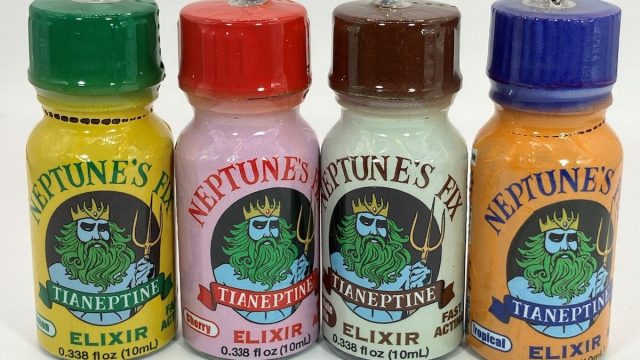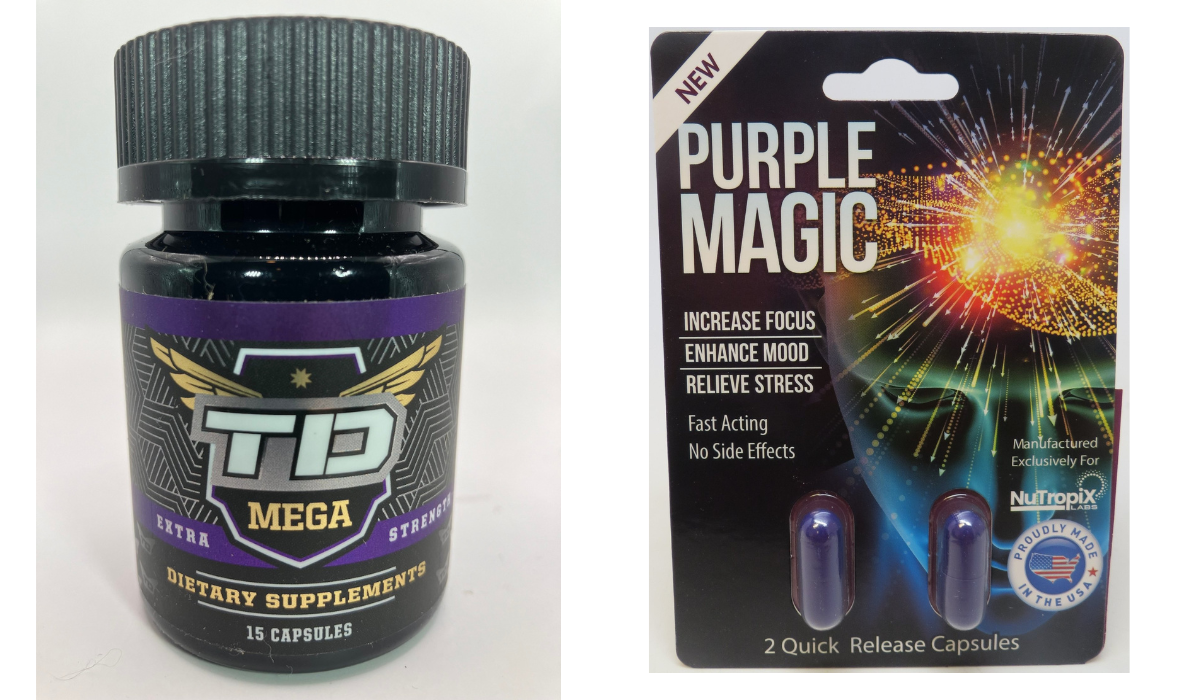FDA Warns Against Popular Gas Station Supplements as Poison Control Calls Spike
These products may contain tianeptine—an unapproved, opioid‑like drug linked to health issues. Here's what to know.

Although they’ve been banned in eight different states, certain brightly colored bottles commonly sold at gas station counters are stirring up controversy yet again. Many contain tianeptine, an opioid-like drug nicknamed “gas station heroin” that’s largely unregulated and illegal to add to any food or beverages in the U.S.
Still, manufacturers are managing to get these energy shots and supplements on shelves, and as a result, U.S. poison control centers have reported a 525% increase in calls from 2018 to 2023. According to a new consumer warning released by the Food and Drug Administration (FDA), these rule-bending products pose an underlying danger that can cause serious health issues. Here’s what to know and which gas station products to avoid.
RELATED: Seven States Have Banned an Energy Supplement Nicknamed “Gas Station Heroin”
What Are These Supplements?
You may see these bottles with names like Neptune’s Fix, TD Red, ZaZa, and Pegasus, reports the New York Post. Sold in convenience stores and gas stations, these tiny shots are positioned as a dietary supplement or cognitive enhancer and claim to improve brain function or treat pain, anxiety, depression, and even opioid use disorder (OUD), per the FDA. They’re also sold online in pill or powder form.
However, they contain tianeptine, an antidepressant that’s licensed for use in some countries, but not here in the U.S. In fact, the FDA has not approved tianeptine for any type of use.
Unfortunately, the FDA does not inspect the ingredients of dietary supplements as heavily as other food, beverage, and health items, which is why illegal forms of tianeptine in dangerous levels are still making their way onto shelves.
Why Is Tianeptine Dangerous?
Although tianeptine is technically not an opioid, it binds to mu-opioid receptors in the brain, producing similar effects to drugs like oxycodone—while carrying similar dangers.
“People seeking to treat their ailments sometimes mistake a product as being safe because it’s easily available, whether online or even at gas stations,” the FDA says. “But availability is no indication of effectiveness or safety. This is especially true of tianeptine, an unapproved drug associated with serious health risks and even death.”
According to experts, side effects of tianeptine use include severely slow breathing, rapid heartbeat, distress, low blood pressure, nausea, vomiting, hallucinations, seizures, or coma. It is also highly addictive, and stopping use can cause withdrawal symptoms, according to the CDC. Fatal overdoses have also occurred in the U.S.
Currently, there is no age restriction to purchase energy shots and supplements sold at gas stations and other convenience stores, and only eight states have outright banned tianeptine: Alabama, Georgia, Michigan, Minnesota, Ohio, Tennessee, Kentucky, and Florida.
Calls to Poison Control Are Surging

The increase in tianeptine-related poisonings and cases of withdrawal suggests these products are becoming stronger—or adulterated with other substances like synthetic cannabinoids.
The U.S. National Poison Data System reported 892 single-substance tianeptine exposures from 2015 to 2023, with a 1,400% total rise during that period—including the 525% surge since 2018. In nearly 40% of these cases, people required medical admission, and 23% landed in critical care.
“In the U.S., reports of bad reactions and unwanted effects involving tianeptine are increasing,” the FDA stated in a May 9, 2025 consumer update. “Annual poison control center cases involving tianeptine exposure, as reported by the National Poison Data System, have increased nationwide, from 4 cases in 2013 to about 350 cases in 2024.”
In 2023, the FDA released a public consumer warning regarding a rise in reports related to Neptune’s Fix. “FDA has received severe adverse event reports after use of Neptune’s Fix products, including seizures and loss of consciousness leading to hospitalization. Consumers who experience a bad reaction to any tianeptine product should seek immediate medical help.”
In 2024, those calls continued, motivating the FDA to demand companies like Super Chill Products and Neptune Resources LLC to voluntarily recall their products. The FDA also sent letters to gas stations and other businesses supplying the products.
“FDA continues to receive severe adverse event reports after use of Neptune’s Fix products, including seizures, loss of consciousness and death,” the report stated at the time. “These products may also interact, in life-threatening ways, with other medications a consumer may be taking. The agency is actively investigating adverse event reports in conjunction with local and state health departments.”
RELATED: Scientists Bust the Anti-Aging Hype Around Common Supplement
How to Avoid These Products
To protect consumers, the FDA is continuing to crack down on the illegal sale of tianeptine. In its most recent statement last month, it stated: “The FDA has issued warning letters to companies distributing and selling unlawful tianeptine products as dietary supplements and unapproved drugs. We also have issued import alerts to help detain tianeptine shipments at our borders.”
That said, if you’re checking out at a convenience store or gas station, avoid buying the brightly-colored energy shots or mental performance supplements promising to improve your cognition or treat pain, anxiety, depression, or withdrawal symptoms.
Specifically, avoid any products under the brand names Tianaa, Zaza, Neptune’s Fix, Pegasus, and TD Red.
If you’ve used one of these products, call Poison Control right away (1-800-222-1222) if you’re experiencing symptoms like slowed breathing, seizures, or severe nausea.





















